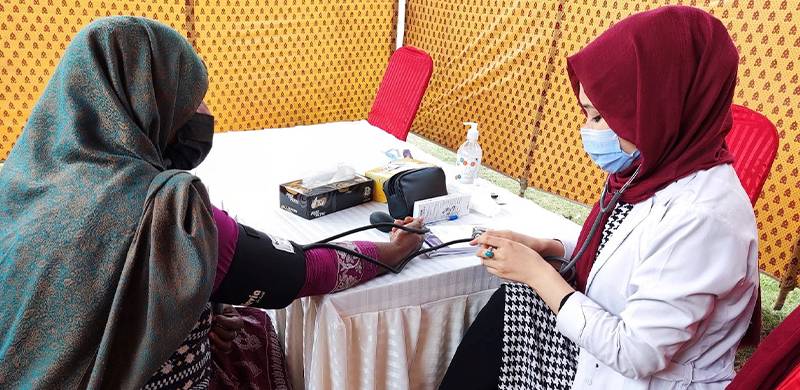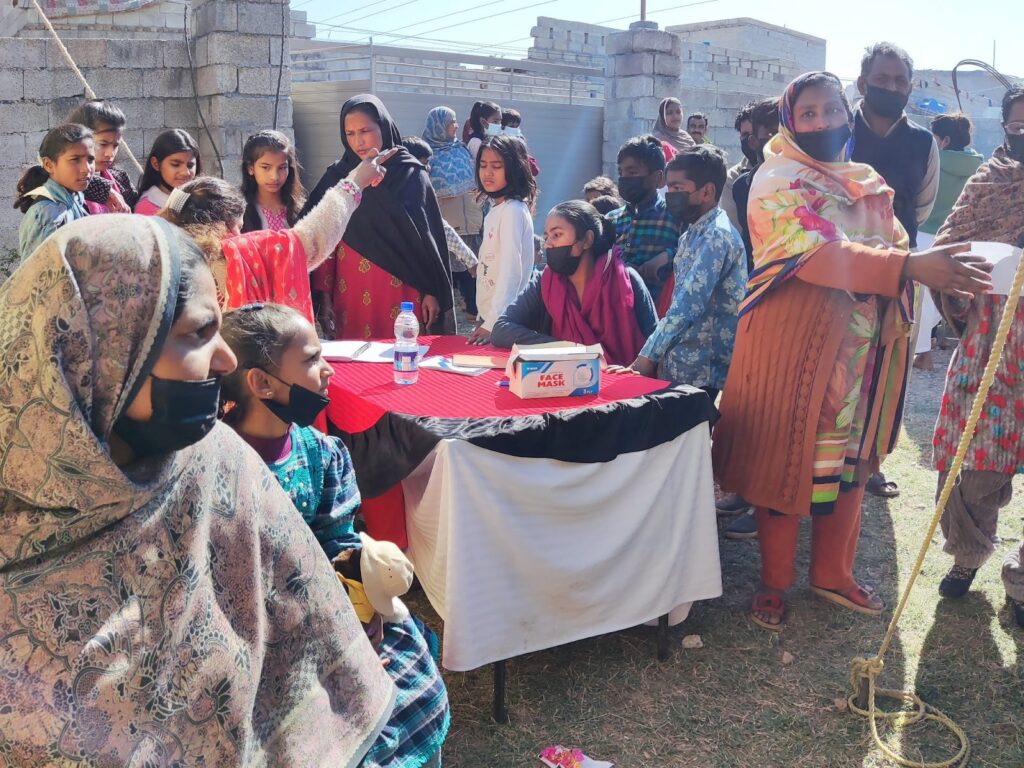
Rimsha Colony H-9 is an underserved area in Islamabad, where many poor Christians live without basic amenities.
Established in 2012, Rimsha Colony still lacks basic healthcare facilities. After surveying the colony to report the basic health issues, Ravadar Minority Women Network uncovered that since the housing structures are weak, people live in tents, without easy and safe access sanitation facilities. People purchase water from the nearby markets at high price or use impure water drawn from the well near the graveyard. The absence of waste management services makes the environment unhygienic, with high risk of disease outbreaks.
The Ravadar team discovered that malnutrition is a basic problem affecting many children. Medical care is out of reach for them. They cannot afford expensive medicines even when their children suffer from fever or diarrhea or flu.
The local women suffer from hypertension, osteoporosis, and vitamin deficiency. The area lacks lady health workers, and women do not approach the only male doctor available for consultation, as they feel uncomfortable to discuss health issues with him. Besides, the doctor charges Rs200 per visit, which they cannot afford.
Considering the vulnerability of the colony population, Ravadar Minority Women Network decided to set up a two-day free medical camp in Rimsha Colony on Feb 26 and 27, 2022. It provided the residents opportunity to receive free checkups and medicines.
“I have diabetes and most of the time my blood-sugar level rises above the normal. Neither do I do have the means to check my sugar level nor doctor’s fee,” says Shazia Joseph*.
Parween Masih* suffers from osteoporosis – “I live in such a poor condition that I cannot afford basic foods such as milk. Due to my weak joints, I find it difficult to work or even walk.”
Male doctors at the camp also examined men in the community. They found that most of them suffer from hypertension and excessive alcohol consumption has weakened their bodies. Doctors provided free medicines and advice to such male individuals to help them improve their health.

A young boy shared, “I have typhoid, and my condition is poor. Due to the lack of medicines and food, I feel lethargic. My parents cannot afford my treatment.”
Around 300 children and females in the Rimsha Colony, as well as men, were provided free medical checkups and medicines. The women were extremely satisfied with the treatment they received from the lady doctor visiting the colony. Ravadar is trying to establish camps in other informal settlements of Islamabad as well.
The residents of Rimsha Colony and underserved areas of Islamabad should be provided with proper basic health services and medicines. According to the World Population Review 2020, Islamabad, the Capital city, is home to 1.7 million people, and is expected to grow to 2.2 million by 2030. A report published by UNICEF in July 2020, titled Profile of Slums/Underserved areas of Islamabad, reported that approximately (38 percent) of the total population of Islamabad lives in slums or underserved areas. Some 3 percent of residents of slums or underserved areas are temporarily displaced or migrants from other parts of the country, while 8 percent are non-natives.
*Note: The names of the interviewees have been changed to protect their identities.
The blog has been published in collaboration with Ravadar Blog – a series that documents the lives of religious minorities in Pakistan.
Photos credit: HIVE Pakistan Facebook page
Established in 2012, Rimsha Colony still lacks basic healthcare facilities. After surveying the colony to report the basic health issues, Ravadar Minority Women Network uncovered that since the housing structures are weak, people live in tents, without easy and safe access sanitation facilities. People purchase water from the nearby markets at high price or use impure water drawn from the well near the graveyard. The absence of waste management services makes the environment unhygienic, with high risk of disease outbreaks.
The Ravadar team discovered that malnutrition is a basic problem affecting many children. Medical care is out of reach for them. They cannot afford expensive medicines even when their children suffer from fever or diarrhea or flu.
The local women suffer from hypertension, osteoporosis, and vitamin deficiency. The area lacks lady health workers, and women do not approach the only male doctor available for consultation, as they feel uncomfortable to discuss health issues with him. Besides, the doctor charges Rs200 per visit, which they cannot afford.
Considering the vulnerability of the colony population, Ravadar Minority Women Network decided to set up a two-day free medical camp in Rimsha Colony on Feb 26 and 27, 2022. It provided the residents opportunity to receive free checkups and medicines.
The local women suffer from hypertension, osteoporosis, and vitamin deficiency. The area lacks lady health workers, and women do not approach the only male doctor available for consultation, as they feel uncomfortable to discuss health issues with him. Besides, the doctor charges Rs200 per visit, which they cannot afford.
“I have diabetes and most of the time my blood-sugar level rises above the normal. Neither do I do have the means to check my sugar level nor doctor’s fee,” says Shazia Joseph*.
Parween Masih* suffers from osteoporosis – “I live in such a poor condition that I cannot afford basic foods such as milk. Due to my weak joints, I find it difficult to work or even walk.”
Male doctors at the camp also examined men in the community. They found that most of them suffer from hypertension and excessive alcohol consumption has weakened their bodies. Doctors provided free medicines and advice to such male individuals to help them improve their health.

A young boy shared, “I have typhoid, and my condition is poor. Due to the lack of medicines and food, I feel lethargic. My parents cannot afford my treatment.”
Around 300 children and females in the Rimsha Colony, as well as men, were provided free medical checkups and medicines. The women were extremely satisfied with the treatment they received from the lady doctor visiting the colony. Ravadar is trying to establish camps in other informal settlements of Islamabad as well.
The residents of Rimsha Colony and underserved areas of Islamabad should be provided with proper basic health services and medicines. According to the World Population Review 2020, Islamabad, the Capital city, is home to 1.7 million people, and is expected to grow to 2.2 million by 2030. A report published by UNICEF in July 2020, titled Profile of Slums/Underserved areas of Islamabad, reported that approximately (38 percent) of the total population of Islamabad lives in slums or underserved areas. Some 3 percent of residents of slums or underserved areas are temporarily displaced or migrants from other parts of the country, while 8 percent are non-natives.
*Note: The names of the interviewees have been changed to protect their identities.
The blog has been published in collaboration with Ravadar Blog – a series that documents the lives of religious minorities in Pakistan.
Photos credit: HIVE Pakistan Facebook page

